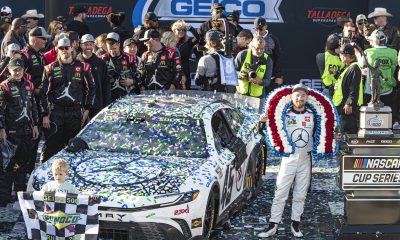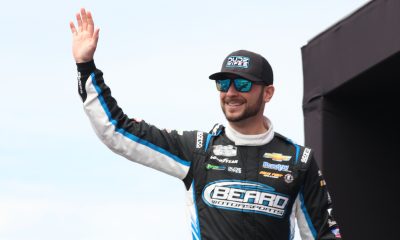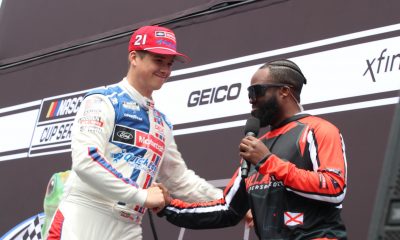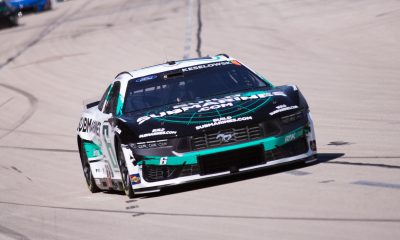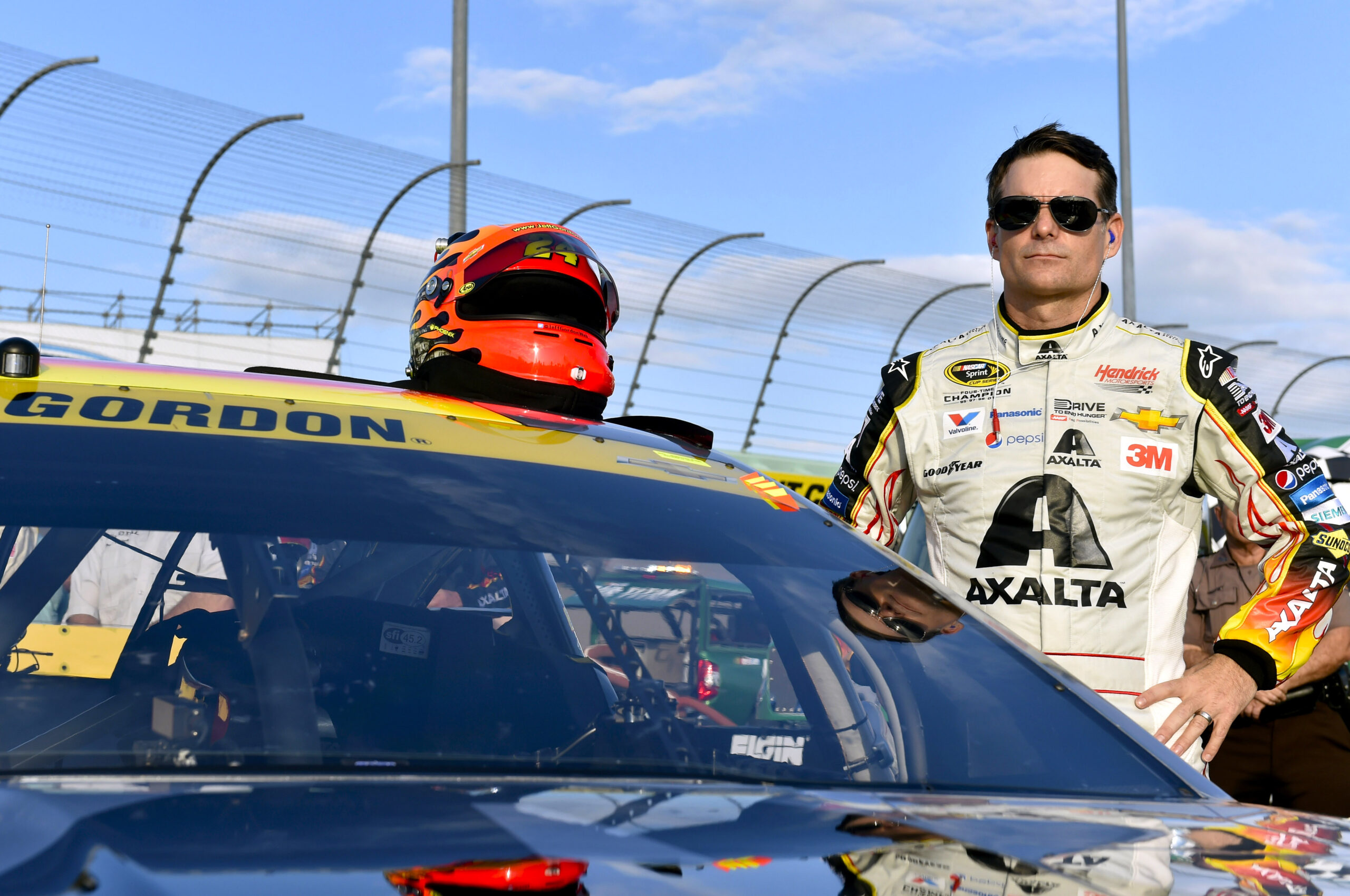
Above all else, Jeff Gordon remains a respected presence in NASCAR. (Photo: Hendrick Motorsports)
By all means, Jeff Gordon greatly transformed the world of NASCAR as a transcendental motorsports star connecting to the sports and pop culture world. Conversely, the Vallejo, Calif. native, a thriving open wheel star who moved to Pittsboro, Ind., began his NASCAR career in the Xfinity Series.
All things considered, Gordon paid his dues, cutting his teeth on the short tracks and superspeedways in the Xfinity Series in 1991 and ’92. Moreover, Gordon was something of a rare presence in NASCAR as a 20-something racer competing against the grizzled veterans from the Southeast.
Of course, most racing fans and sports fans know about Jeff Gordon’s meteoric rise after a successful sophomore Xfinity Series season with Bill Davis’ No. 1 Baby Ruth Ford Thunderbird team. From November 15, 1992, to November 22, 2015, Gordon and his No. 24 Chevrolet rewrote the history books and landscape of NASCAR in more than 93 ways.
Certainly, Gordon was competitive when he substituted for Dale Earnhardt Jr in the No. 88 in eight races in 2016. More importantly, the four-time NASCAR Cup Series champion continues his contributions in stock car racing as a FOX NASCAR analyst.
Ultimately, Gordon takes pride with the accolades of his career as as he does as a family man and philanthropist. Although Gordon may not be “The Wonderboy,” the 49-year-old motorsports legend still has his youthful spunk and enthusiasm as an analyst for FOX NASCAR.
Prior to the start of this season, I caught up with Gordon about his commentating efforts, how his FOX NASCAR team weathered through the first races after the COVID-19 pandemic pause last year and naming certain cars in the Hendrick Motorsports fleet. Now, let’s get on track and “In the Hot Seat with Jeff Gordon” here in The Podium Finish!
Rob Tiongson : You, Mike Joy and the entire FOX NASCAR crew did a fantastic job covering the races last year. How challenging was it to call races from the Steve Byrnes Studio and provide the same insightful analysis for fans?
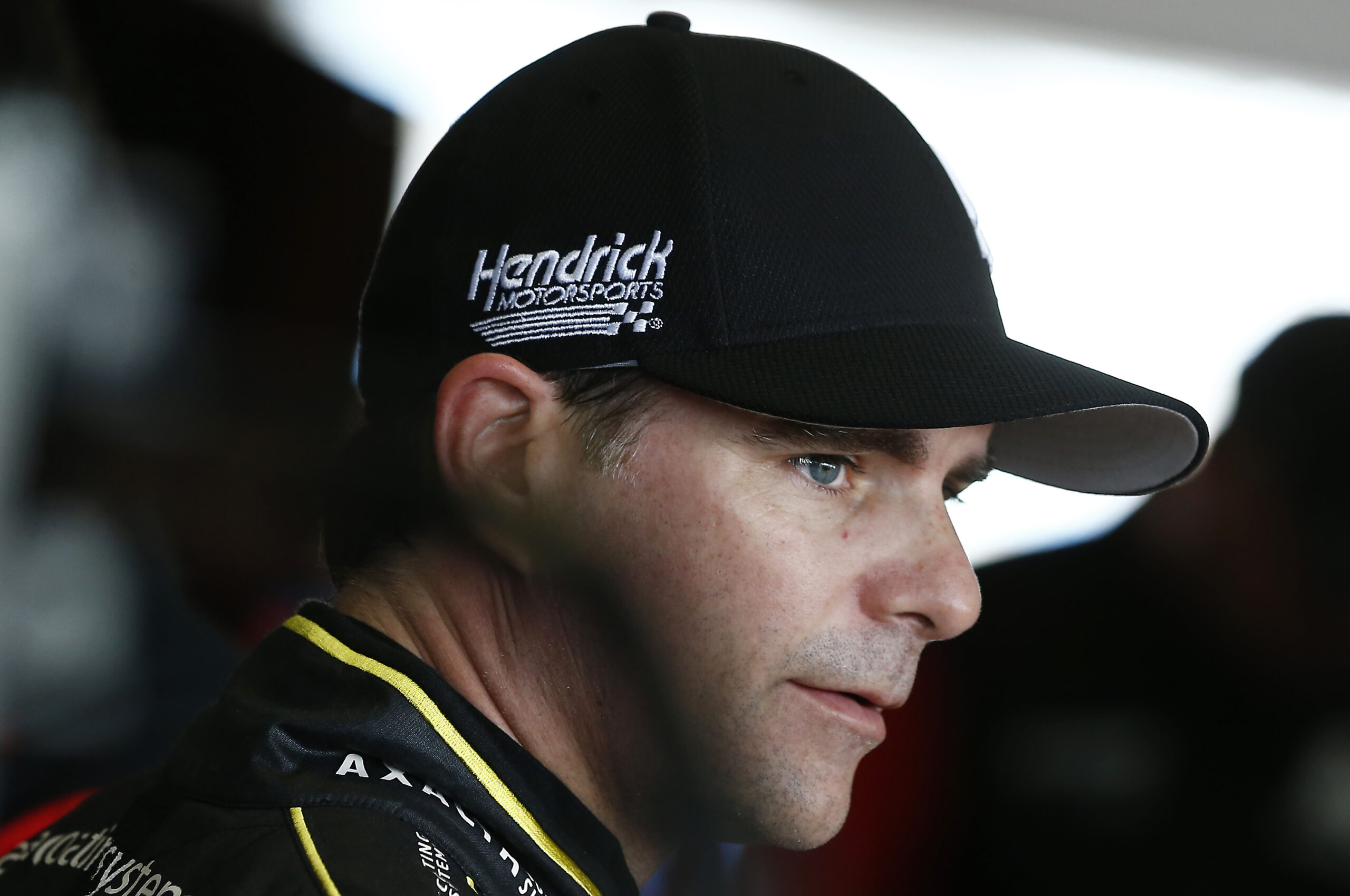
Without a doubt, Jeff Gordon and his FOX NASCAR colleagues pulled together during the pandemic. (Photo: Hendrick Motorsports)
Jeff Gordon : Yeah, I think we were just excited to be able to get back to racing. We had kind of a test run at it through iRacing, which was something I didn’t expect. To me, that’s the theme of how life has been, at least for me. And I’m sure a lot of people would say the same thing.
Through all this, it’s just the unknowns, the things getting thrown at you that you weren’t prepared for. But you’re doing things in a way to just stay engaged and do what you can and see what opportunities come around the corner.
So the iRacing one came up. It was fascinating to be able to see how realistic that is. But it also gave us an opportunity to kind of stay in the game, if you will, I guess is the best way to put it. Stay fresh and stay in a rhythm. So when we got back to racing for real, I feel like we were kind of a well-oiled machine in a lot of ways of doing this remotely and what the challenges were and able to work a lot of those things out because of iRacing.
Also, we’re very lucky that we have a studio here in Charlotte. So it was close to home for me. And that studio helped us really connect to the track. And almost in some ways, in many ways, it felt pretty seamless with how we were able to call races and see the action at the track while we’re calling it.
Tiongson : That’s what I thought was so fantastic reflecting upon those races last year. Everyone was prepared and informed. All of you were to make it so that, even though you were in the studio, fans wouldn’t have known. They would have just thought you guys were at the track as well. So, job well done on that.
Gordon : I think the first race or two, we couldn’t talk to the drivers. We had to do it through a remote at the track. And so you may have seen the pit reporter doing that. But we got that sorted out right away and were able to talk to them.
The studio offers up a huge screen to be able to place cameras almost as if it was the booth and be able to see the racetrack, not in its entirety. But most of what we needed and similar to what we’d see at the track. Obviously, nothing’s quite like being at the track. But we had a good setup. So we were fortunate for that.
Tiongson : I can absolutely understand for sure on that. As a journalist, it’s been challenging. But we’re all adapting as well as we can, for sure.
You’ve mentioned in the past that you evaluate your performances in past telecasts to improve upon your calls and analysis. Be it in the booth or, like you said, calling races in the studio. How similar has it been to prepare for telecasts as it was for you in your NASCAR career driving the No. 24 car?
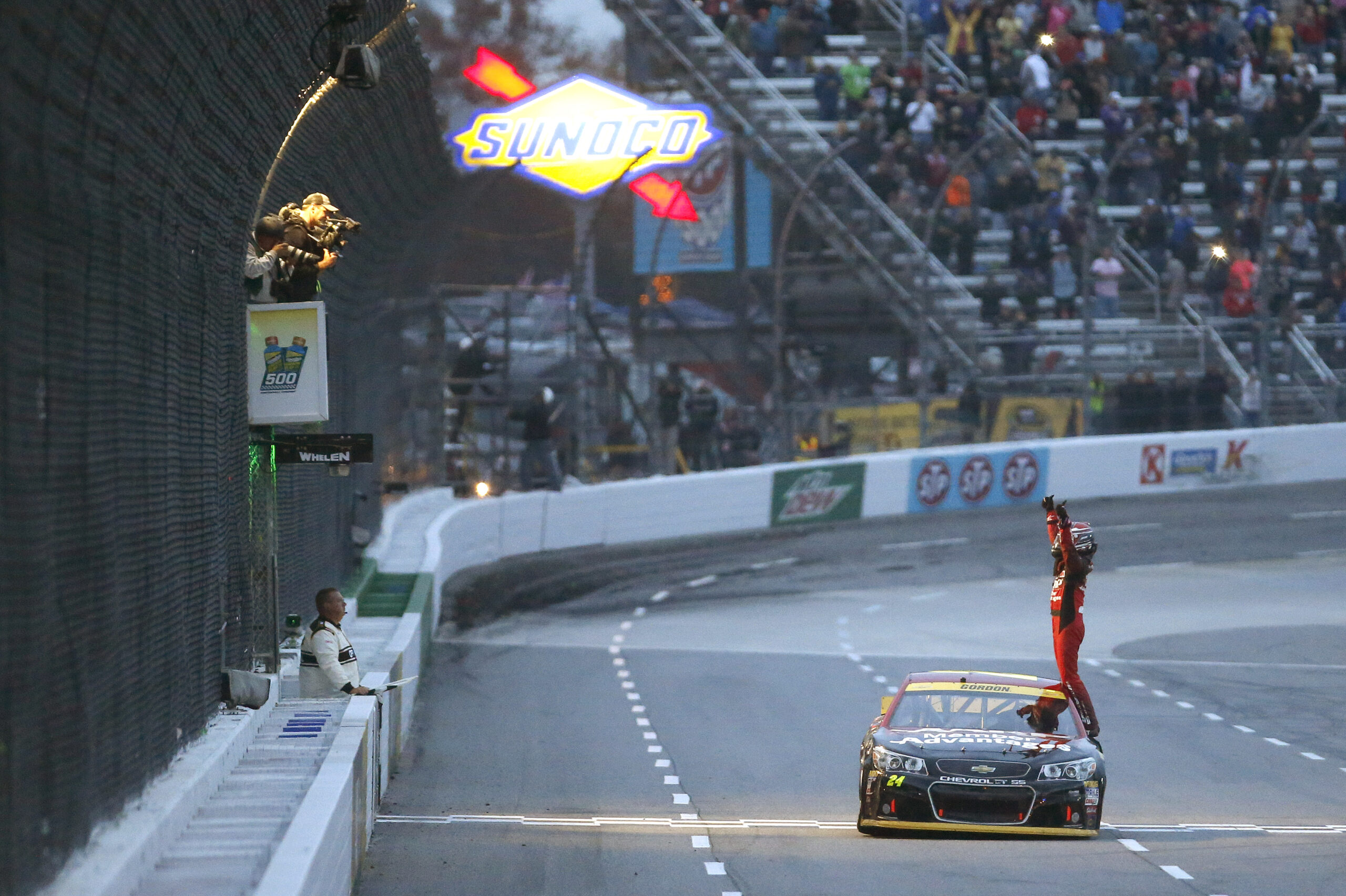
Similarly, Jeff Gordon finds his role with FOX NASCAR quite similar with racing his famed No. 24 car. (Photo: Hendrick Motorsports)
Gordon : It’s very similar. Obviously, the most natural thing for me was driving the racecar, getting behind the wheel and competing. But the preparation was what you had to work so hard at. Especially in the probably four or five years, the teams have more access to data, gathering more information of our car and our performance, as well as other competitors out there.
And so that really got ramped up in the way you met with the team and the engineers. That’s very much what it’s like working for FOX and doing TV. You’re working with your producer and your director and the team behind the scenes and the other commentators, pit reporters, all of that. It’s just one big team.
So you’re constantly trying to follow what the latest stories are, how the flow of the race is going to go, what to expect, what to be prepared for. And then once they drop the green, it’s no different than race. It’s live. And you have no idea what you’re going to say or what’s going to come next.
So that part of it – all of that really – is very similar to competing in a race. Other than, your risk-taking is with your words going out on the air versus being in a heated battle and possibly making contact with the wall. Or having a tire failure or something like a crash.
Tiongson : At least when you’re calling races from the booth or studio, you don’t have to feel the same impacts of hitting the wall. But it’s really cool to see how you’ve carried over those 30 years of racing in a stock car and then bring it to the studio.
You’ve really come into your own as an analyst. I can’t even compare you to anybody. I was going to say you were like Buddy Baker or Ned Jarrett, but no. You’re just like you with your driving career – you’re your own person.
What makes you feel like you stand out compared to your contemporaries who became analysts after their racing careers?
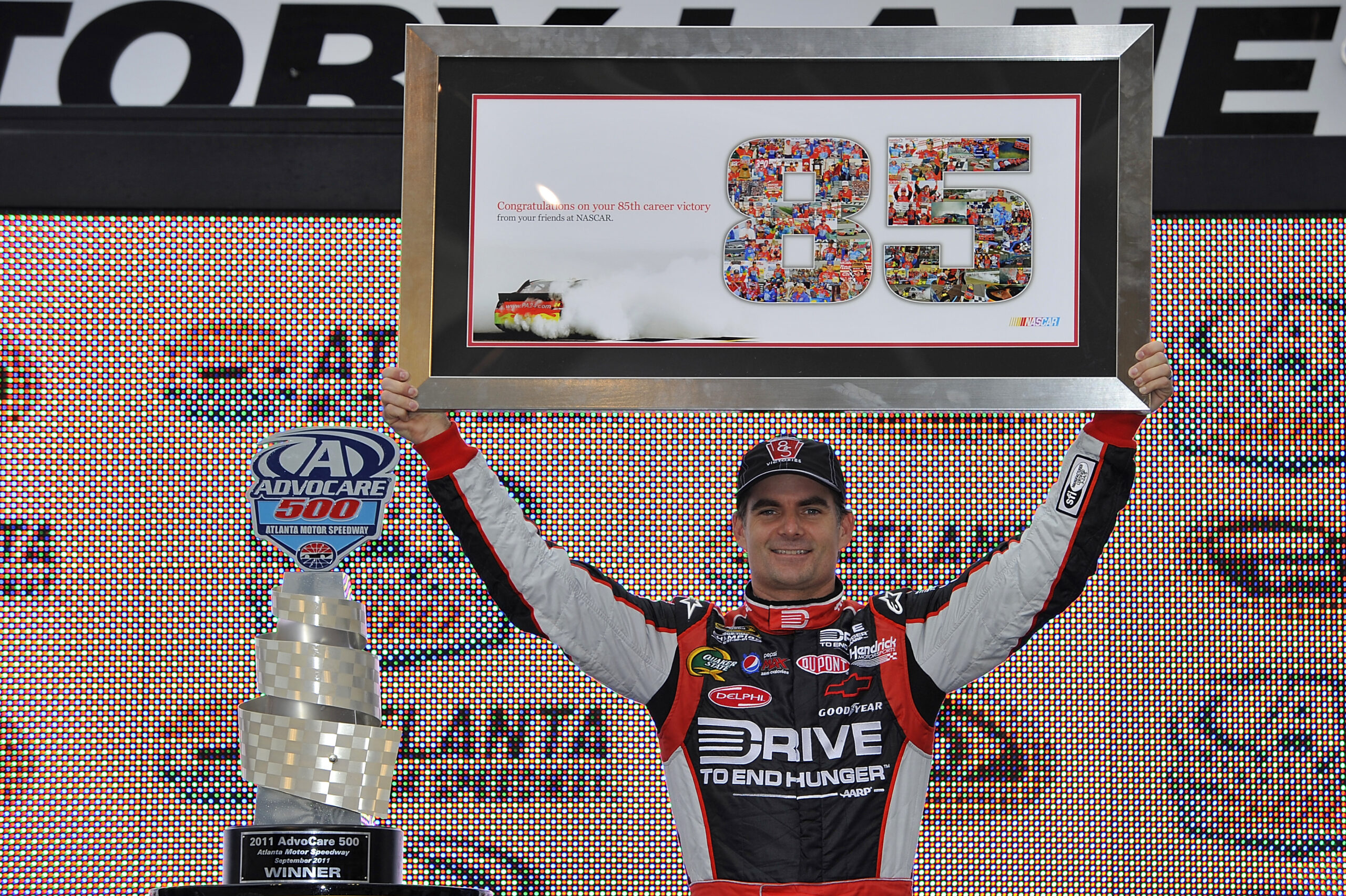
In general, Jeff Gordon established himself as a legend such as the time of his 85th Cup win in 2011. (Photo: Hendrick Motorsports)
Gordon : Well, I appreciate you saying that, because that’s my goal. I want to be me and do what feels comfortable for me. And I hope that the viewers at home can appreciate the way I see things or the way I call things.
Certainly the more you do it, just like driving, the more reps you get, the more comfortable and confident you get. I’ve got a tremendous amount of support from my teammates at FOX since I arrived.
Last year was a whole new challenge for me. I learned so much from Darrell Waltrip and working with him. And we became great friends. But he taught me a lot. and really helped me get into this role of being comfortable and confident and understanding how to cover a lot of these stories.
Last year, obviously not having him in the booth put more responsibility and weight on my shoulders. And it gave me some opportunities to maybe dive a little bit deeper into some different angles of what I’m seeing out there. So it was a year of growth. And I went into it a little nervous, not knowing exactly how that was going to work. But I really loved it.
I loved the season that we had. Even with all the challenges, I thought it was one that was very rewarding. Obviously, you can’t change who you are. You’ve just got to be you and hope that that works.
And you have to know that you’re not on an island by yourself, right? You’re just one of the members that makes it work. You’ve just got to do your job the best you can, again, like the driver. And that’s what I try to do.
Obviously, I have a lot of knowledge and experience from all the years of driving. Also, my role at Hendrick also helps me stay very connected to the teams and the cars and the drivers and what’s going on. So you utilize all your resources and your experience and try to bring that to every race. And all those years of driving have helped me tremendously.
Even though the cars have changed and some things have changed, it still lets me watch what’s going on and put myself in the driver’s seat, inside the helmet, behind the wheel, and try to relate that to the people watching. And maybe seeing something that isn’t just totally obvious.
Tiongson : I can understand both sides. From your perspective, you were just trying to make the best decision for your career at that point. So, I can’t blame you on that. I talked with Rusty Wallace, who, by the way, says you guys are best buds now…
Gordon : That’s right. (chuckles)
Tiongson : He told me that his favorite car was Midnight, the one he dominated short track races at the time. I know Blacker was your car. But you also had a car called Butthead. I kind of imagined that’s because of Beavis and Butthead from MTV.
But whose idea was it to come up with that car’s name? And what made it your car to go to when you went to the short track races in the late ‘90s?
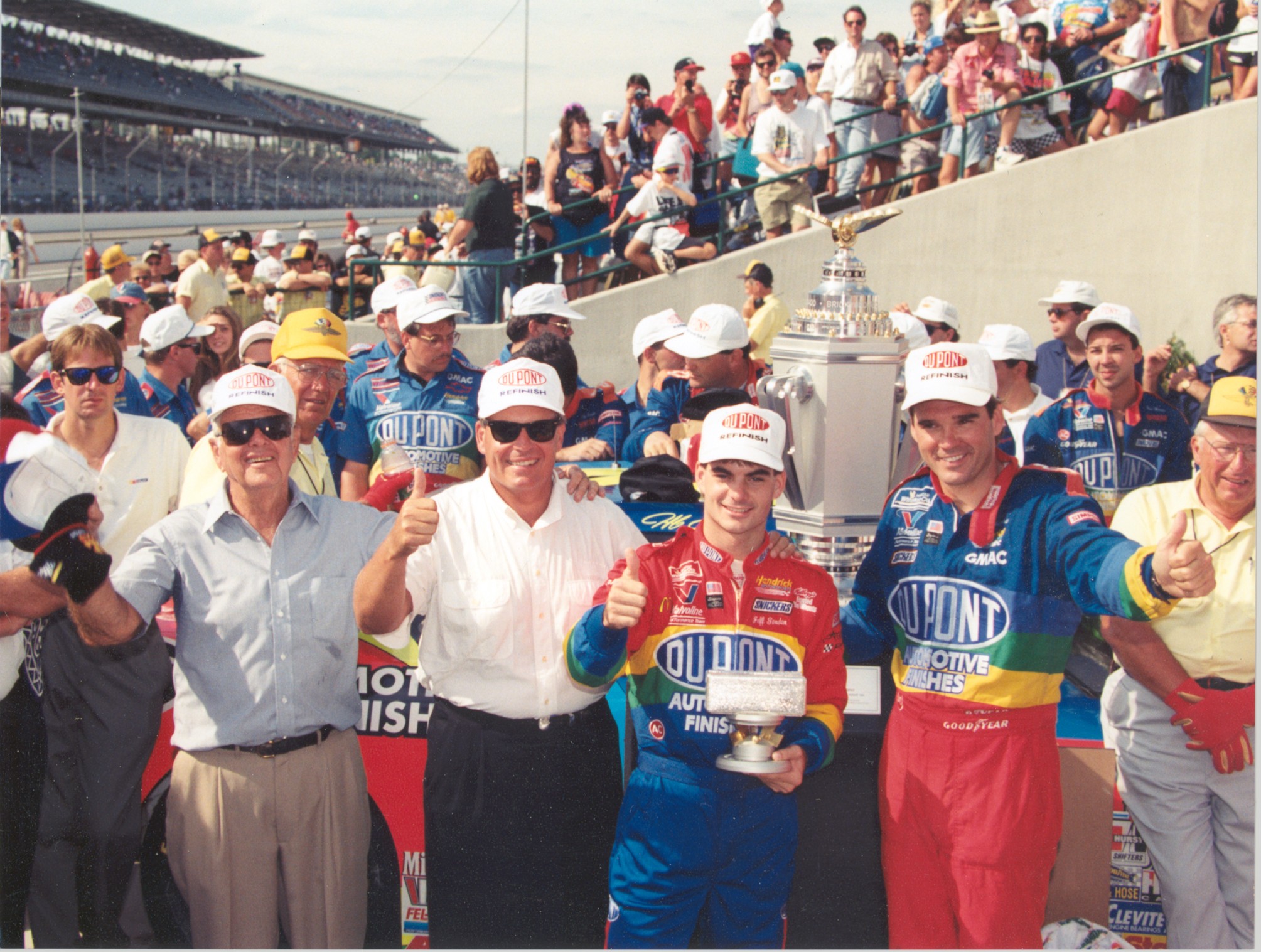
Surely, Gordon enjoyed his first wins in cars whose names began with a “B.” (Photo: Hendrick Motorsports)
Gordon : Well, you’re tied to a racecar, especially back then, right? They didn’t build cars as identical as they do today. You’d build a car. And then you’d take it to the track. It was either really good or really bad.
When you got a really good one, you wanted to have that car every weekend if you could. So Ray’s probably the guy to ask of what made that car stand out versus others in its build and chassis and body.
But the name, that all came from the guys in the shop and Ray Evernham and how he would motivate them. As they’re building these cars, they have their own personality as you’re building them. And some are finicky and just give you problems and are a butthead. I mean, we had one, Blazer, because it caught on fire when they were doing some welding or something on the car.
And so all I know is that they decided they wanted to have the cars all start with B and called the Killer B’s. But that was all Ray and the guys in the shop. I went along with it and was happy to drive those cars. But I didn’t really have a lot of input on the names.
Tiongson : Fair enough, for sure. Evan Posocco from iRacing wanted to know, what year was your favorite to compete in in the Cup series?
Gordon : Well, of course it was 1998.
Tiongson : Oh, yeah. That’s a good year.
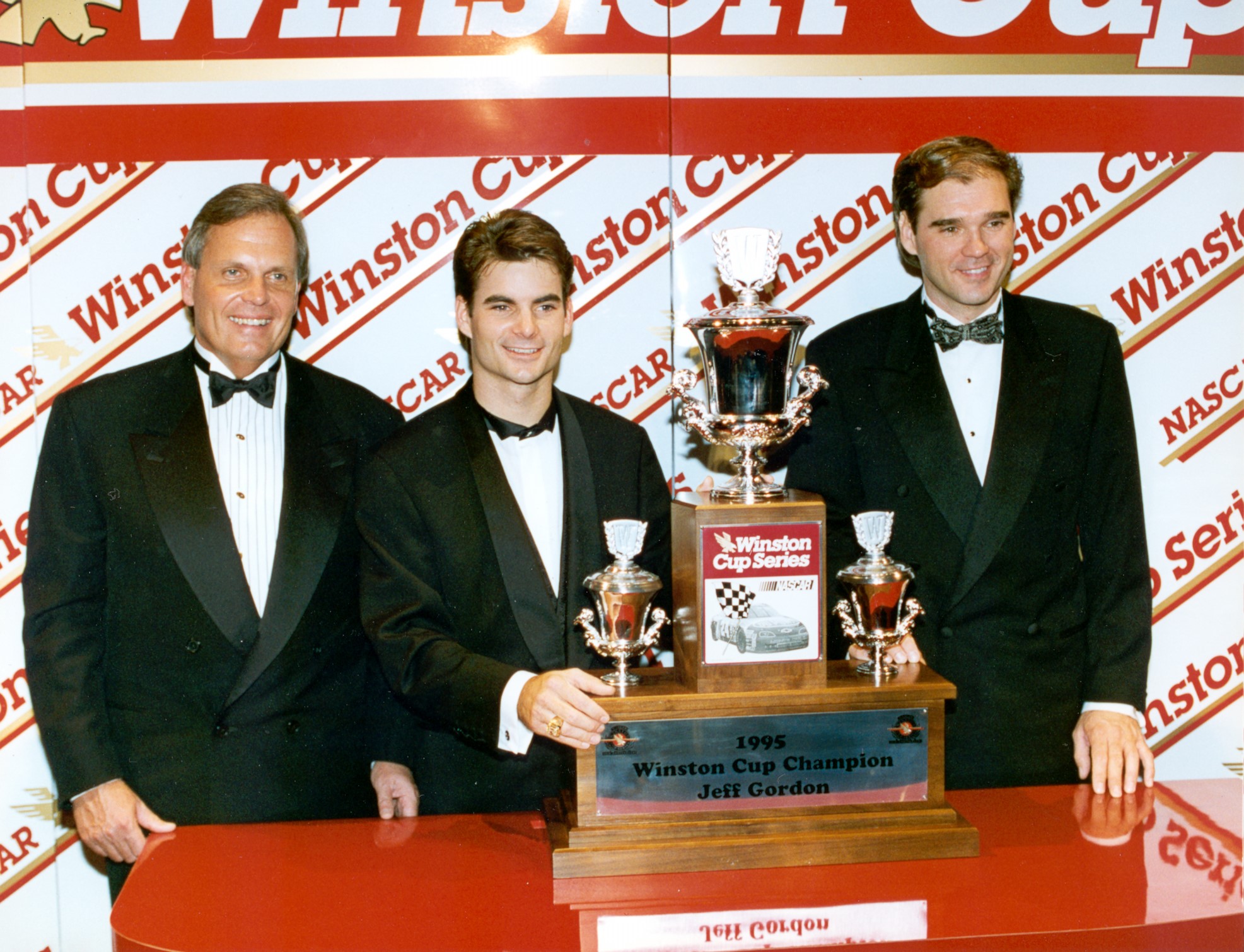
Although 1998 may be Gordon’s favorite year, the 1995 season kicked off his era in NASCAR. (Photo: Hendrick Motorsports)
Gordon : You’re always going to go back to the year that you had the most success. And it was just one of those dream years. 13 wins and the championship. And really, I never had… I mean, I had good years. But I’ve never had a year quite like that. So that one always stands out.
Editor’s Notes
Special thanks to Jeff Gordon for taking the time for this latest “In the Hot Seat” interview series on The Podium Finish. Also, thanks to Jon Edwards and Hendrick Motorsports for making this interview possible. You can keep track of Jeff Gordon on his Facebook and Twitter accounts, his official website and here on TPF! Congratulations on 30 years in NASCAR, Jeff!
Rob Tiongson is a 30-something motorsports journalist who enjoys sports like baseball, basketball, football, soccer, track and field and hockey. A Boston native turned Austinite, racing was the first sport that caught his eyes. From interviews to retrospective articles, if it's about anything with an engine and four wheels, it'll be here on TPF, by him or by one of his talented columnists who have a passion for racing. Currently seeking a sports writing, public relations, or sports marketing career, particularly in motorsports. He enjoys editing and writing articles and features, as well as photography. Moreover, he enjoys time with his family and friends, traveling, cooking, working out and being a fun uncle or "funcle" to his nephew, niece and cat. Tiongson, a graduate of Southern New Hampshire University with a Bachelor of Arts in Communication, pursues his Master of Arts in Digital Journalism at St. Bonaventure University. Indeed, while Tiongson is proud to be from Massachusetts, he's an everywhere kind of man residing in Texas.

